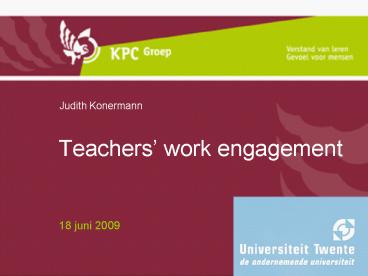Teachers work engagement - PowerPoint PPT Presentation
1 / 26
Title:
Teachers work engagement
Description:
acknowledgement, appreciation (leaders / HRM department. HRM & performance. Overall ... Vigour is characterized by high levels of energy and mental resilience while ... – PowerPoint PPT presentation
Number of Views:218
Avg rating:3.0/5.0
Title: Teachers work engagement
1
Teachers work engagement
Judith Konermann
- 18 juni 2009
2
Agenda
- Welcome
- Judith Konermann, Karin Sanders, Piety Runhaar
- Research together with University of Twente
(Twente Centre of Career Research) - Presentation
- Discussion
- Final words
3
Purpose presentation
- Teachers work engagement
- Work engagement and vitality How can we keep
good teachers in the swim? - How can HR practices contribute to teachers work
engagement?
4
Actual developments in eduction (NL)
- Shortage of teachers
- Ministery of Education, Culture and Science
Commissie Leraren / Actieplan Leerkracht! - Better rewards
- Stronger profession
- A professional school
- Importance of good teachers for education
5
HRM and performance
- HRM is conceptualised in terms of carefully
designed combinations of such practices geared
towards improving organisational effectiveness
and hence better performance outcomes (Boselie et
al, 2005) - Definition the planned HR deployments and
activities intended to enable an organisation to
achieve its goals (Wright McMahan, 1992)
6
Performance outcomes
- Financial (profit)
- Organisational (productivity, efficiency)
- HR-related (attitude and behaviour of employees,
eg. satisfaction, commitment)
7
Best fit versus best practice
- The best practice view (Pfeffer, 1994 1998)
identifies a set of HR policies that, it is
argued, is associated with improved performance
in all types of organisation and, by implication,
for all types of employees. - The best fit approach (Schuler and Jackson, 1987
Miles and Snow, 1984) argues that performance is
maximised when the HR policies adopted are
consistent with the business strategy. - Both of these approaches assume that the HR
policies adopted will be implemented as intended
and have the same effect on all employees who
work for the organisation.
8
Difference in HR experience
- Various authors have questioned these assumptions
because of the differences between intended HR
policies and employees' experience (Wright and
Boswell, 2002 Paul and Anantharaman, 2003
Purcell et al, 2003), because complex
organisations have different types of employees
who may be managed successfully through diverse
sets of HR policies (Guest, 1999 Lepak and
Snell, 1999 2002 Marchington and Grugulis,
2000 Melian-Gonzalez and Verano-Tacorante, 2004
Purcell, 1999 Wright and Boswell, 2002
9
HRM in a broader perspective
Strategic
Performance HRM Attitude
and behaviour of
employees
Formal selection, reward (pay for performance),
training, careerperspectives exit
(outplacement) Informal attention,
acknowledgement, appreciation (leaders / HRM
department
10
HRM performance
Overallstrategy
HRstrategy
HR practices
HRM outcomes
(improved) Internal performance
(improved) financial performance
11
Kinnie et al, 2005
Intended policies
Actual practices
Practices as experienced
Employee outcomes
Employee reactions
Unit level outcomes
12
Attitude and behaviour
- Passive
- Not very flexible for the organization
- Satisfaction, commitment
- Active
- Offers flexiblity to deal with changes in the
organization - Work engagement
13
(No Transcript)
14
Why important for teachers?
- Engaged teachers have a positive impact on the
performance of pupils / students - Engaged teachers are less willing to quit their
jobs - Engagement helps teachers to deal with workstress
and workload
15
Work engagement
- Work engagement is defined as the positive,
fulfilling work-related state of mind in its own
right that is characterized by vigour, dedication
and absorption. - Vigour is characterized by high levels of energy
and mental resilience while working, the
willingness to invest effort in ones work, and
persistence in the face of difficulties. - Dedication is characterized by a sense of
significance, enthusiasm, pride, inspiration and
challenge. - Absorption is characterized by being fully
concentrated and happily engrosses in ones work,
whereby times passes quickly and one has
difficulties with detaching oneself from work.
(Schaufeli, Salanova, González-Romá, and Bakker,
2002)
16
Work engagement (JD-R model)
- Job demands Stress/burnout
- Performance
- Job resources Work engagement
-
-
17
Job demands
- Job demands refer to those physical,
psychological, social, or organizational aspects
of the job that require sustained physical and/or
psychological (cognitive and emotional) effort or
skills, and are therefore associated with certain
physiological and/or psychological costs . - Pupil misbehaviour
- High workload
- Bad physical work environment
18
Job resources
- Job resources refer to those physical,
psychological, social, or organizational aspects
of the job that may reduce job demands and the
associated physiological and psychological costs,
are functional in achieving work goals, and
stimulate personal growth, learning and
development. - Job control
- Access to information
- Support from leader (LMX)
- Innovative schoolclimate
- Social climate
19
Study work engagement
- Research in 21 schools (n415) for secondary
education - Dependant variable is work engagement
- Independant variable are aspects of daily
teaching and HR practices - Control variables gender, age, working in
education, working at this school, type of
education - 5-point Likertscale
- Hierarchical regression analysis (Baron Kenny,
1986 Aiken West (1991)
20
Model
Work engagement (a) Vigour (b) Dedication (c)
Absorption
H1
Aspects of daily teaching
H2
HR practices
21
Results
p 0.01 p 0.05
22
Relation between aspects of daily teaching and
work engagement
p0.01 p0.05
23
Moderating effect HR practices
p0.01 p0.05 p0.1
24
Conclusion
- H1 Aspects of daily teaching has a positive
relationship with (a) vigour, (b) dedication and
(c) absorption - We can confirm hypothesis 1.
- H2 HR practices moderate the relationship with
aspects of daily teaching and (a) vitality, (b)
dedication and (c) absorption - Hypothesis 2a is not confirmed. Hypothesis 2b en
2c are marginally significant.
25
Discussion
- Engaged teachers can benefit from HRM policy
- Engaged teachers are easily recognized
- The role of the leader is crucial in relation to
engaged teachers
26
Final words































